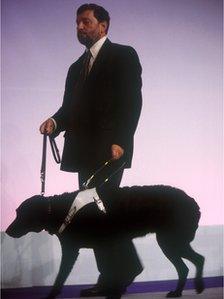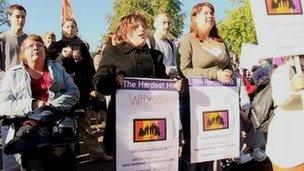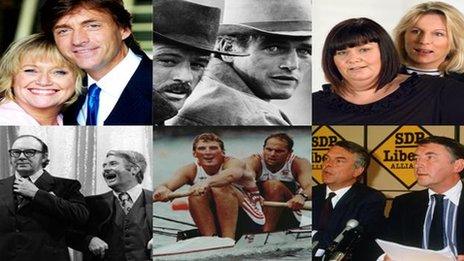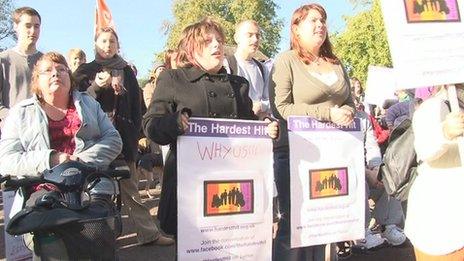Why aren't more disabled people becoming politicians?
- Published
- comments

David Blunkett reached the top of politics but not many disabled people have followed
Although one in six people have a disability, only a handful of our MPs are disabled people.
And it seems despite the success of the likes of Jack Ashley and David Blunkett, the political representation of disabled people hasn't really improved substantially in recent years.
Perhaps it's asking too much to expect one in six MPs to have some form of disability, but surely it would be better if the commons chamber looked a bit more like the society it governs?
Disabled people might also wonder whether the policies that affect them might be drawn a little differently if they had more of a say.
The experience of one disabled councillor in York might not encourage others to enter politics though.
Lynn Jeffries has been a well-known campaigner on disability issues for more than 20 years.
In fact she was so well-known that in 2010, Labour approached her to join the party and stand for the council.
After some hesitation, she decided that she might be able to achieve even more inside the political machine.
Two years on, although she remains a councillor, she has resigned from the Labour group after finding it hard to get her voice heard.
She said: "There was quite a lot of being patronised, and a lot of believing that disabled people are people you do things for.
"That's such a shame because what councils miss is that experience of being a disabled person.
"It's so valuable to them in terms of policy-making as disabled people bring solutions to their own difficulties.
"Not to get that and not to engage with disabled people is quite a loss really."
Party system
At the time of her resignation York's Labour group leader accused Ms Jeffries of walking out after failing to win the arguments within the group.
But the campaigner felt the party whip prevented her speaking when she disagreed with policies that affected disabled people.
And other campaigners also fear they would get lost in the party system.
Steve Wilkinson is well-known in Newcastle and beyond for his campaigning zeal on disability access. He's clashed with councils over the years about their lack of action.
And the wheelchair user has been asked whether he would be interested in entering politics. But he says that's not for him.
He said: "I think with the first past the post system you really have to be either Conservative, Labour, Liberal Democrat or perhaps UKIP.

Disabled people have protested about the impact of politicians' decisions but few enter parliament
"You could stand as an independent, but the chances are you wouldn't get elected, so I don't think I'd be able to champion the causes of the people I'd want to represent."
Of course there are also other barriers as well. Not all of our council offices and ministries have great disabled access, and extra support might be needed.
But there is some help at hand with those issues.
Last year the government began offering grants to disabled people with aspirations to enter politics.
The Access to Elected Office for Disabled People fund has £2.6m available.
Individuals can apply for up to £20,000 to help them stand for office.
The government says it's about levelling the playing field rather than giving disabled people an unfair advantage.
For example, the money could be used to support the extra transport costs of someone with mobility problems or provide sign language interpreters for deaf people.
Disabled Prime Minister?
And some people do think there are grounds for optimism.
Newcastle Disability Forum's chair Alison Blackburn believes we could even have a disabled prime minister in the future.
She said: "Anything in politics is gruelling and the person has got to be supported with certain areas of their disability and in their home life.
"But I do think over the years things will change and we will get more disabled people in politics."
But so far interest in that government access fund has been limited.
By February 2013, just £33,970 has been awarded to six applicants, with six more applications being considered.
If that sluggish pace continues only a fraction of the fund will be spent by the time it's due to end in summer 2014.
Some then believe further change is needed. The campaign group Disability Politics UK wants the law changed to allow MPs to job share.
It believes that would allow more disabled people to enter parliament.
Labour MP John McDonnell has presented a private members bill to make it possible, but without government support it is unlikely to succeed.
But perhaps our political parties also need to look at their own attitudes.
Lynn Jeffries certainly believes the existing political elite needs to change its attitude to remove psychological as well as physical barriers.
She said: "Lots of the barriers start because councillors don't engage properly with disabled people.
"To be honest, unless that changes I do not think we will get disabled people wanting to be councillors."
- Published23 November 2012

- Published22 October 2011

- Published28 June 2011